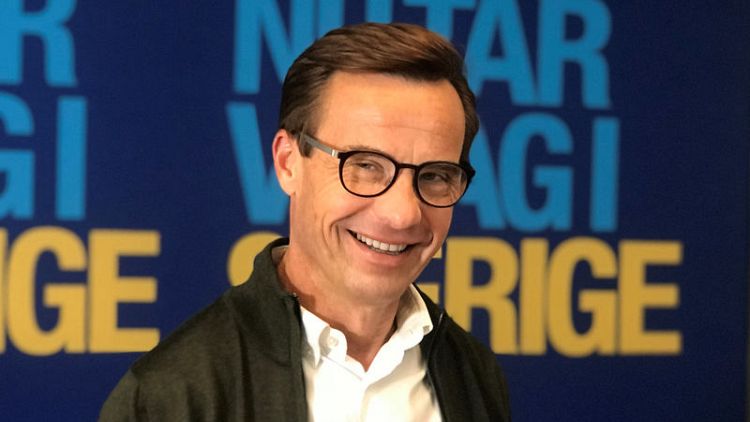By Johan Ahlander and Johan Sennero
STOCKHOLM (Reuters) - The centre-right frontrunner to become Sweden's next leader said future governments would have to be "humble" to survive, hinting that negotiations on a new ruling coalition would be the hardest in modern times amid a rise in the far right.
While still shunned by all main parties, the Sweden Democrats, founded in part by white supremacists in the 1980s, are now backed by one in five voters and will sorely test any new prime minister's ability to form a viable government.
"I'm not going to set out my conditions in advance. I note that we have a responsibility to our voters to try to implement our policies and do the best we can," Moderate Party leader Ulf Kristersson told Reuters, cautioning against high expectations.
"It is a whole new parliamentary situation," Kristersson, 54, a soft-spoken pragmatist, said in an interview at party headquarters in an upscale district of downtown Stockholm.
"Every new government will need, by Swedish standards, to be a humble government which understands that it is the parliament that holds the power, not the government."
Negotiating directly with the nationalist Sweden Democrats, whose message that immigration is tearing apart the country's generous welfare state has polarised politics, remains officially out of the question for rival parties.
Few know the cost of breaking the taboo better than Kristersson, who last year took over the Moderates when his predecessor was ousted for saying she was willing to talk to the Sweden Democrats.
While Kristersson is the bookies' favourite for premier, his Moderates are polling poorly and their four-party Alliance is likely to need at least tacit support from the Sweden Democrats to replace the Social Democrat-led government.
"We will not negotiate with the Sweden Democrats on forming a government, nor regarding whether that government can take power, nor regarding a budget. That won't happen," he said.
BALANCING ACT
Sweden's Migration Agency is forecasting the Nordic country will take in some 23,000 asylum seekers in 2018, the fewest in five years and a long way off the record 163,000 in 2015, when more than one million migrants streamed into the European Union.
Under Kristersson, the Moderates have discarded the liberal "open-border" views of former leader and premier Fredrik Reinfeldt and increasingly aligned immigration policy with that touted for decades by the Sweden Democrats.
"We need a strict immigration policy, probably stricter than the one we have today, if we are to take care of the very large number of immigrants we already have. To me that is totally obvious," Kristersson said.
The veteran pro-EU politician is also banking on promises of a crackdown on crime that many Swedes associate with immigrants to deflect the Sweden Democrats - without negotiations - but that strategy could backfire.
The Sweden Democrats have said they will act to bring down any government that does not listen to them, leaving Kristersson with a precarious path to winning and holding power.
Prime Minister Stefan Lofven's Social Democrats have around 25 percent support in polls, ahead of the Moderates and Sweden Democrats, but neither his centre-left bloc nor the rival Alliance look likely to garner a majority on Sept. 9.
Complex parliamentary arithmetic indicates Kristersson will succeed in ousting Lofven in a post-election vote by MPs, but he will have a tough task filling the Social Democrat's shoes.
If he is seen as yielding to the Sweden Democrats he may be ditched by the centrist and liberal parties in his Alliance.
Should he fail, few options appear open to form a stable government. The Sweden Democrats' surge has transformed a political landscape long defined by clear-cut, sturdy centre-left and centre-right blocs in the Riksdag (parliament).
Indeed, snap elections could become reality for the first time in 60 years.
"I won't form or continue to lead a government that gets nothing done," said Kristersson. "So there are certainly such risks."
Opinion poll graphic: https://tmsnrt.rs/2LmSZFD
(Editing by Niklas Pollard and Mark Heinrich)
